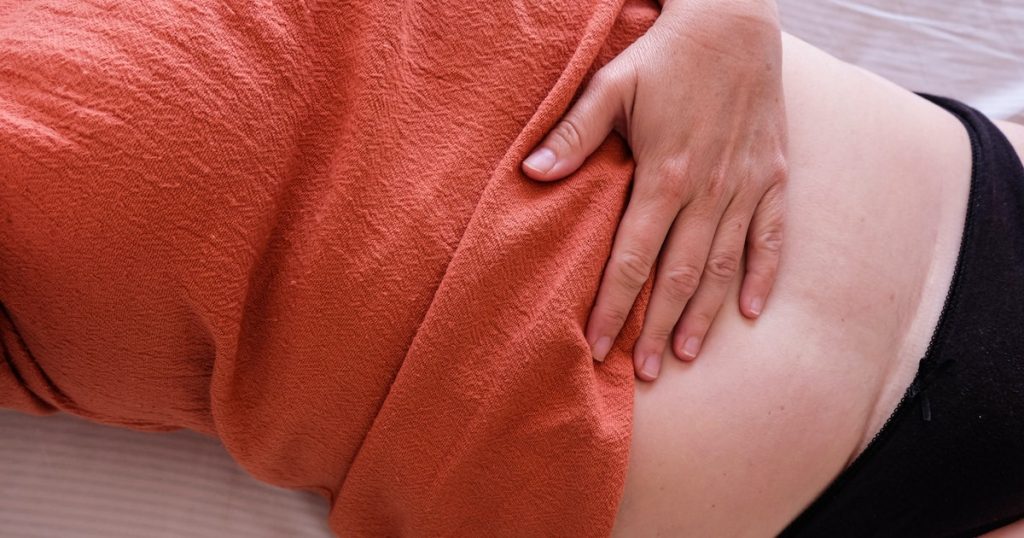Increased flatulence after giving birth is known as postpartum gas in women. Postpartum gas is typical and often passes away on its own accord, but it may potentially indicate a pelvic lesion or underlying medical issue.
In this article, we examine the factors that contribute to postpartum abdominal discomfort and gas. Additionally, we discuss when to consult a doctor and several types of therapy, particularly self-care.
Is it typical?
Increased stomach gas is a common postpartum symptom for many women. Throughout and following pregnancy, a woman’s body undergoes a lot of modifications. It is typical for someone to experience differences in their bowel movements postpartum, or shortly after giving birth. These modifications might involve:
- perinatal gas
- experiencing uncontrollable or loose bowel motions
- constipation
Whether the individual was delivered vaginally or by cesarean, these modifications might still occur.
Postpartum gas symptoms include:
Farting, belching, and stomach cramps are examples of gas. These gastrointestinal abnormalities might go away on their own or may need to be treated, contingent upon the reason.
Reasons
Some variables involved in the birthing process or underlying medical conditions can be the cause of postpartum gas. They frequently have little influence over these factors. Other causes have to do with lifestyle choices and could be avoided.
Postpartum gas may have several reasons, including:
Damage to the pelvic floor
Postpartum flatulence may get worse if you consume dairy products. Muscles and nerves in the pelvic floor may be stretched and damaged during pregnancy and childbirth. This could make it harder for someone to regulate when they pass gas.
Episiotomy
During childbirth, an individual could require a quick surgical operation known as an episiotomy. To avoid tearing, the surgeon makes an incision between the anus and the vaginal entrance. It might take some time for an episiotomy to heal. Additionally, it could cause postpartum gas and anal incontinence episodes by weakening the abdominal muscles.
Constipation
If a woman experiences excruciating trapped gas following giving birth, constipation may be to blame. When someone is constipated, they may have irregular bowel movements and hard, lumpy stools. Bloating and stomach discomfort are other symptoms of constipation.
Diet and way of life
Consuming foods high in sorbitol, lactose, fructose, or soluble fiber may make you feel gassier. Avoiding packaged foods, chewing gum, and sweets is an excellent suggestion when trying to reduce gas buildup. A woman might try consuming less of each food category one at a time if she has postpartum gas. This can assist in determining which substances cause them gas.
When bowel motions become uncontrollable, a pelvic floor or anal injury may be present. Even if the harm caused has already been repaired, it may still need additional care. A person ought to additionally think about contacting a physician if their constipation lasts for longer than a couple of days. Medication is often not necessary if postpartum gas just develops and no additional symptoms are present.
After giving birth, numerous individuals have more flatulence. Individuals ought to consult a medical professional should they discover that gas and bloating have become persistent issues. Such symptoms may indicate an underlying medical issue in certain people.
Home Cures and Medical Care
- Performing Kegel exercises can help those who experience anal incontinence. Typically, medical personnel will address any pelvic floor damage while the mother continues to reside in the hospital after giving birth. The person could need further treatment if their injury fails to recover adequately. Kegel exercises for the pelvic floor may be helpful in anal incontinence rehabilitation. The pelvic floor muscles are regularly tightened and relaxed during kegel exercises. In order to cease urinating or passing gas, a person contracts these muscles.
- Short-term constipation treatment may be available with over-the-counter laxatives or stool softeners. Dietary modifications may be helpful in preventing constipation and flatulence from returning.
- People experiencing postnatal gas can additionally benefit from drinking lots of water and yoga practices that enhance digestion, such as the triangle pose.
A person could occasionally struggle to pass a bowel movement. People can help themselves by changing their diet and exercising more naturally to help them empty their bowels more frequently.
Everybody has a unique way of experiencing bowel movements. Although the frequency of bowel movements varies from person to person, doctors believe that three times per week to three times per day is within the acceptable range.
The capacity to undergo a bowel movement can be impacted by a variety of factors, including food, sickness, and habit changes. A drug that induces stool production is known as a laxative. People can employ certain natural therapies as substitutes as well.
Natural solutions
One might experiment with certain organic treatments to promote bowel movements. The following behaviors, foods, and drinks to try, as well as herbal cures that could help alleviate constipation, are outlined.
Workout
The muscles in the lower part of the gastrointestinal tract can be stimulated by a workout.Exercise of any kind, including a brief stroll or jog, can help induce stool production.
Calmness and alignment
It might be distressing to not be able to urinate when needed. It is unhealthy to strain or force the body to pass feces; therefore, you should attempt to unwind and take it easy.
It may be simpler to defecate if the knees are elevated above the hips. While using a restroom, one method of lifting the knees is to place the feet upon a solid surface or footstool.
Peaches
Since fiber aids in the movement of food through the gastrointestinal tract, this dried fruit is an excellent source of fiber. A few prunes could be beneficial in promoting bowel movements.
Senna
Senna is a plant whose fruit and leaves are sometimes used as a type of herbal laxative. It is offered in tablet or liquid form. The effects of the herb last for around 8 hours. Senna can function overnight if you take it before bed, which is something some individuals opt to do. This frequently leads to a morning bowel movement.
Conclusion
Postpartum gas is a common occurrence after giving birth and typically passes away by itself. After giving birth, the majority of individuals regain control of their bowels within a few months.
It is wise to consult a physician if postpartum gas is accompanied by additional symptoms. If certain pelvic floor ailments require additional care, the doctor can examine you.
Resources:
- Chin, K. (2014, September). Obstetrics and fecal incontinence. Clinics in Colon and Rectal Surgery, 27(3), 110–112
https://www.ncbi.nlm.nih.gov/pmc/articles/PMC4174184/ - Eason, E., Labrecque, M., Marcoux, S., & Mondor, M. (2002, February 5). Anal incontinence after childbirth. Canadian Medical Association Journal, 166(3), 326–330
https://www.ncbi.nlm.nih.gov/pmc/articles/PMC99311/













